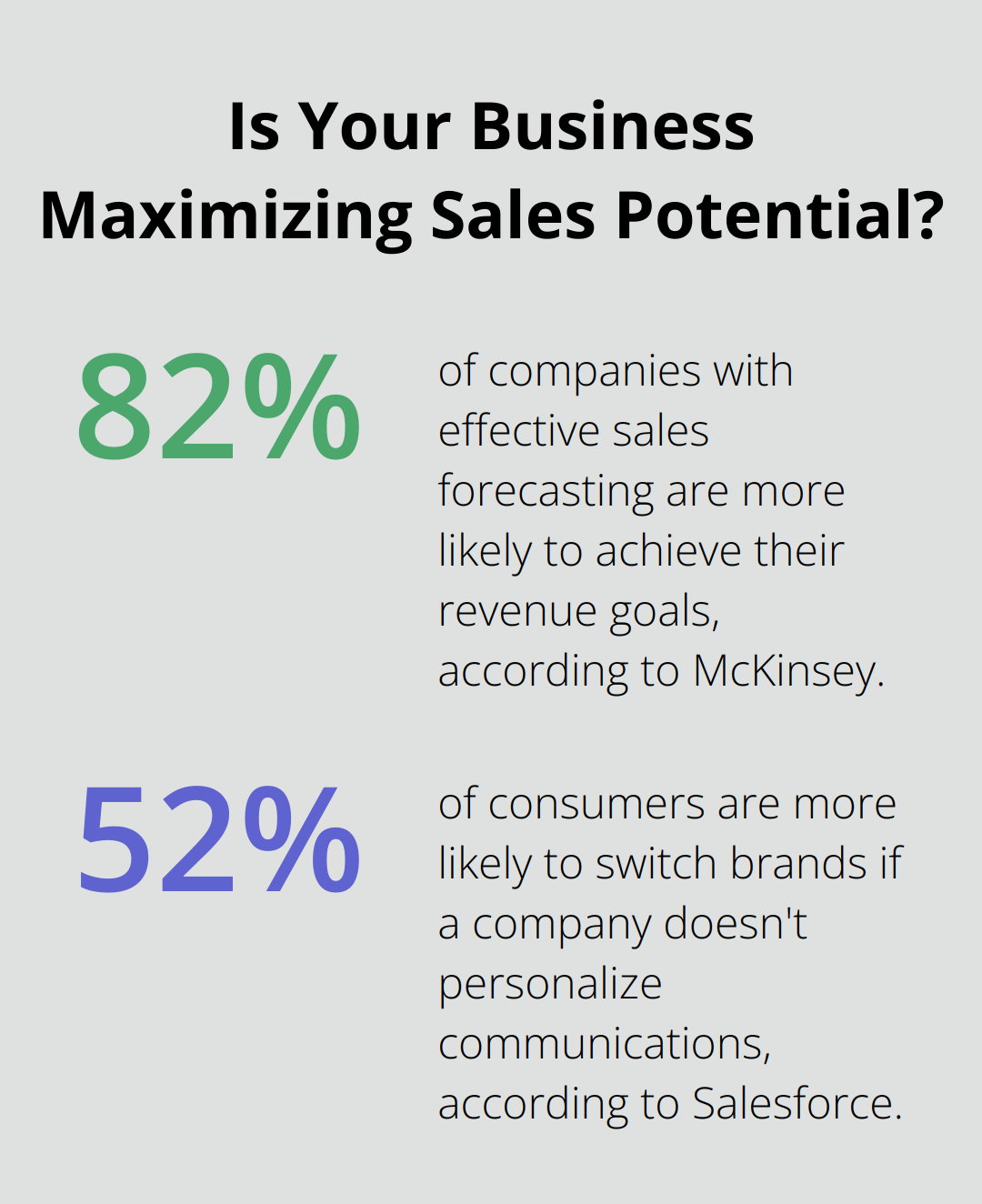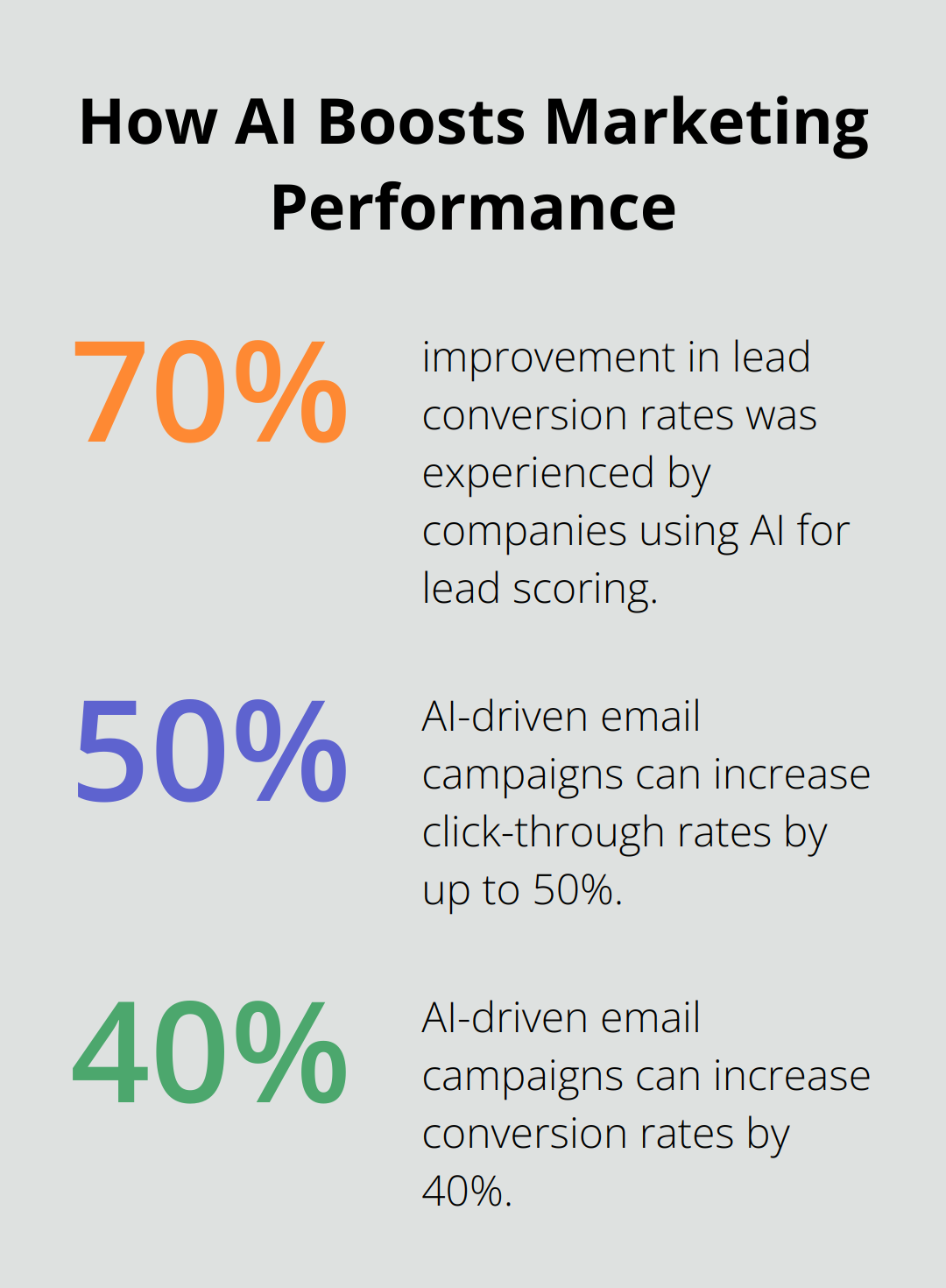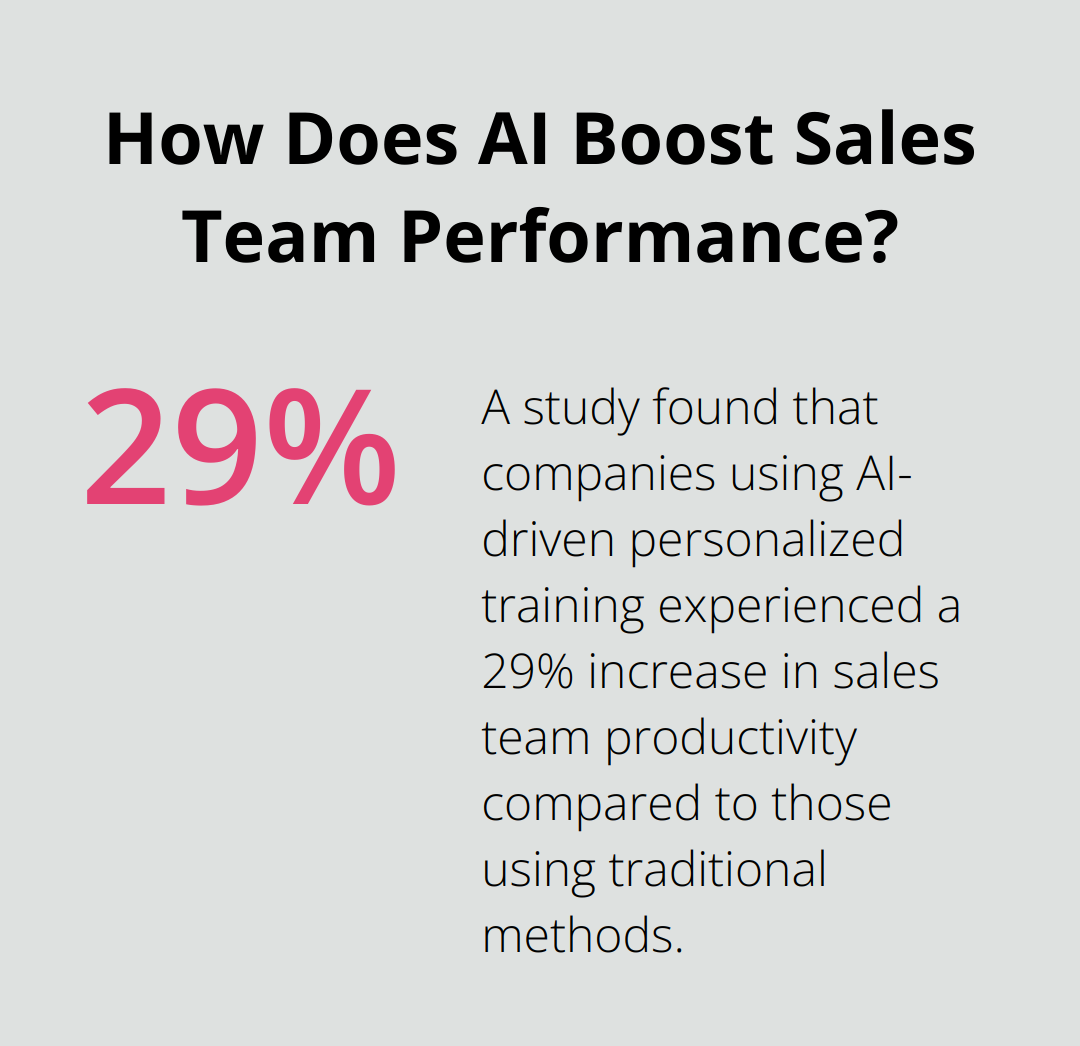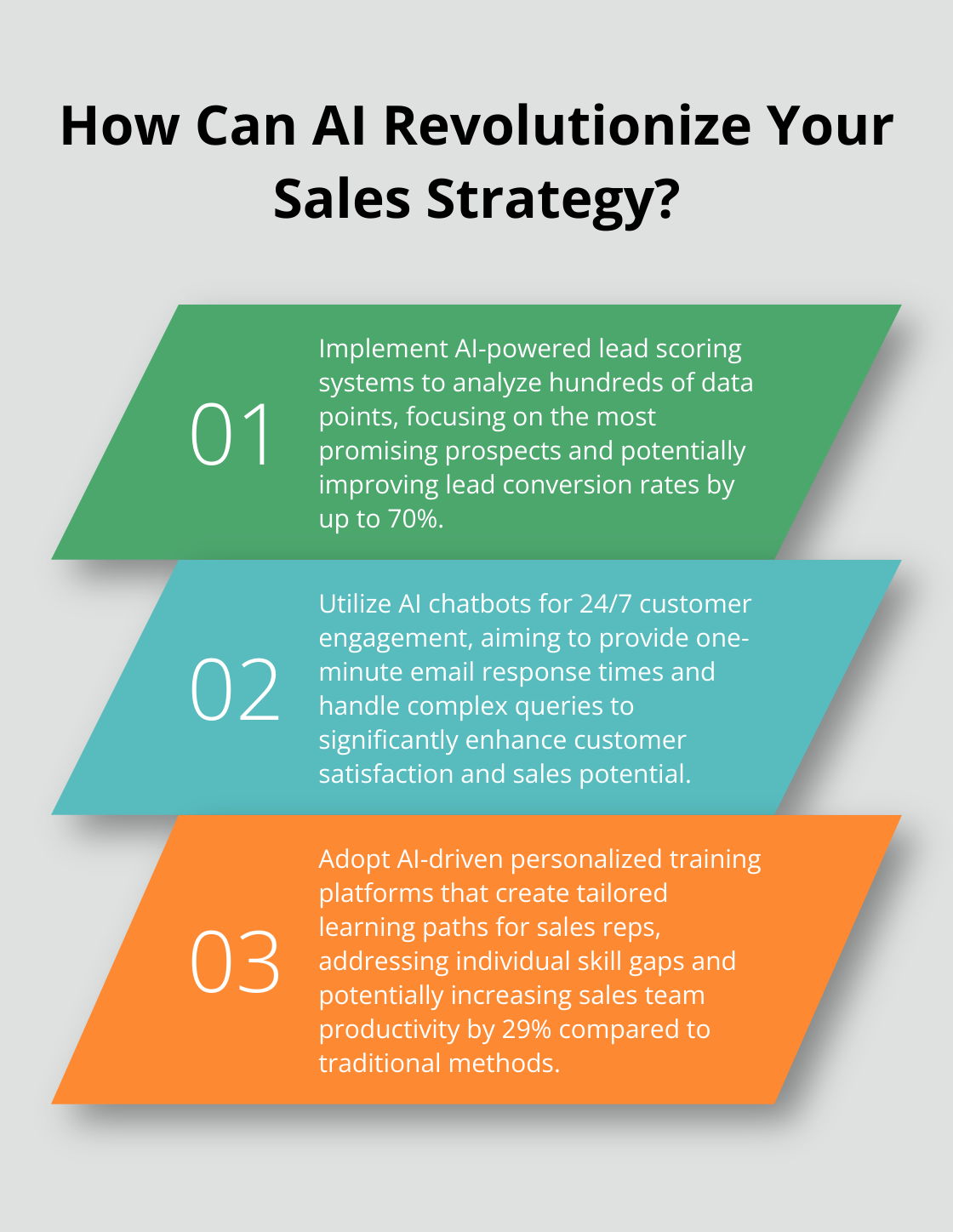At Help Reply, we’re witnessing a revolution in sales enablement powered by artificial intelligence. AI is reshaping how sales teams operate, from gathering insights to closing deals.
Sales enablement and AI are combining to create powerful tools that boost efficiency and effectiveness across the entire sales process. This blog post explores how AI is transforming sales enablement and why it’s becoming essential for staying competitive in today’s fast-paced business landscape.
How AI Boosts Sales Intelligence
Real-Time Analysis for Swift Decision-Making
AI transforms sales intelligence by providing unprecedented insights into markets, customers, and performance. The days of waiting weeks for sales reports are over. AI now processes vast amounts of data in real-time, enabling sales teams to make informed decisions instantly. For instance, AI analyzes customer interactions, purchase history, and market trends to suggest optimal next steps for each prospect. This real-time capability allows sales reps to adjust their approach mid-conversation, significantly increasing their chances of closing deals.
Predictive Analytics: Forecasting Sales with Precision
AI’s predictive analytics revolutionize sales forecasting. By analyzing historical data, market trends, and external factors (like economic indicators), AI predicts future sales with remarkable accuracy. According to McKinsey, companies with effective sales forecasting are 82% more likely to achieve their revenue goals. This precision allows businesses to optimize inventory, allocate resources effectively, and set realistic targets.
Personalization: Tailoring Strategies at Scale
Understanding customer behavior is key to sales success, and AI excels at uncovering these insights. AI creates detailed customer profiles by analyzing data from various touchpoints (website visits, email interactions, purchase history). These profiles enable sales teams to personalize their approach for each prospect, increasing engagement and conversion rates. Salesforce reports that 52% of consumers are more likely to switch brands if a company doesn’t personalize communications.
Advanced Applications: Sentiment Analysis
As AI technologies continue to evolve, more advanced applications emerge. Sentiment analysis, for example, becomes increasingly sophisticated, allowing sales teams to gauge customer emotions and tailor their approach accordingly. Customer sentiment analysis AI helps businesses identify potential growth opportunities that come out of customers’ perceptions and experiences. This level of insight was previously unimaginable and continues to transform the sales landscape.

AI offers powerful capabilities, but it’s important to note that it’s a tool to enhance human skills, not replace them. The most successful sales teams use AI to augment their expertise, allowing them to focus on building relationships and closing deals while AI handles data-heavy tasks.
As we explore the transformative power of AI in sales intelligence, it’s equally important to understand how it automates and streamlines various sales processes. Let’s examine how AI-driven automation is reshaping the sales landscape.
How AI Streamlines Sales Processes
AI revolutionizes sales processes, making them faster, more efficient, and more effective. This transformation of sales operations frees up valuable time for sales teams to focus on high-value activities.
Smarter Lead Scoring and Qualification
AI-driven lead scoring changes the game for sales teams. Instead of relying on gut feelings or basic demographic data, AI analyzes hundreds of data points to accurately predict which leads are most likely to convert. These factors include website behavior, engagement with marketing materials, and social media activity.

A study found that companies using AI for lead scoring experienced a 70% improvement in lead conversion rates. This precision allows sales reps to focus their efforts on the most promising prospects (dramatically increasing efficiency).
Automated Email Campaigns That Convert
The era of generic, one-size-fits-all email campaigns has ended. AI now powers highly personalized, automated email sequences that adapt based on recipient behavior. These systems determine the best time to send emails, craft subject lines with higher open rates, and even adjust content based on individual preferences.
Salesforce reports that AI-driven email campaigns can increase click-through rates by up to 50% and conversion rates by 40%. This level of personalization at scale was simply impossible before AI (and now transforms how businesses communicate with prospects).
24/7 Customer Engagement with AI Chatbots
AI-powered chatbots have transformed customer engagement, providing instant responses at any time of day. These aren’t your grandfather’s chatbots – modern AI chatbots handle complex queries, learn from interactions, and even detect customer sentiment.
According to Gartner, by 2027, chatbots will become the primary customer service channel for roughly a quarter of organizations. This shift isn’t just about cost savings – it’s about providing better, faster service. For example, AI solutions (like Help Reply) offer one-minute email response times, 24/7, significantly enhancing customer satisfaction and sales potential.
Predictive Sales Forecasting
AI enhances sales forecasting accuracy by analyzing historical data, market trends, and external factors. This predictive capability allows businesses to optimize inventory, allocate resources effectively, and set realistic targets. Companies with effective sales forecasting are 82% more likely to achieve their revenue goals, according to McKinsey.
Intelligent CRM Systems
AI-powered Customer Relationship Management (CRM) systems automate data entry, provide real-time insights, and suggest next best actions for sales reps. These intelligent systems learn from each interaction, continuously improving their recommendations and helping sales teams build stronger relationships with customers.
As AI continues to advance, we expect to see even more innovative applications in sales. The next section explores how AI transforms these critical aspects of sales enablement, further empowering sales teams to achieve peak performance.
AI Revolutionizes Sales Training
Tailored Learning Experiences
AI-powered platforms analyze individual sales rep performance data to create personalized learning paths. These systems identify knowledge gaps and skill deficiencies, then recommend specific training modules to address these areas. If a rep struggles with objection handling, the AI might suggest targeted exercises and real-world examples to improve this skill.

A study by the Sales Management Association found that companies using AI-driven personalized training experienced a 29% increase in sales team productivity (compared to those using traditional methods). This tailored approach ensures that each rep receives the most relevant and impactful training, which maximizes their potential and drives better results.
Realistic Scenario Simulations
AI-powered virtual role-playing has transformed how sales reps practice their skills. These simulations create lifelike scenarios that adapt in real-time based on the rep’s responses, mimicking actual sales conversations. This technology allows reps to practice handling objections, pitching products, and negotiating deals in a safe, low-stakes environment.
By exposing sales representatives to a wide range of scenarios, AI simulations can prepare them for almost anything they might encounter in real-world situations. This comprehensive preparation helps build confidence and improves overall performance in actual sales interactions.
Data-Driven Performance Analysis
AI excels at analyzing vast amounts of sales performance data to provide actionable insights. These systems can identify patterns in successful sales calls, pinpoint areas for improvement, and even predict future performance based on current behaviors.
For instance, AI might analyze call recordings to assess factors like talk-to-listen ratio, use of specific keywords, or emotional tone. It then compares these metrics to those of top performers, offering concrete recommendations for improvement. According to a recent study, AI can help businesses increase sales productivity, reduce costs, and improve sales performance.
This data-driven approach removes the guesswork from coaching, which allows sales managers to provide targeted, evidence-based feedback. It also enables continuous improvement, as the AI constantly updates its recommendations based on the latest data and market trends.
AI-Powered Coaching Assistants
AI coaching assistants provide real-time guidance to sales reps during customer interactions. These tools can analyze conversations as they happen, offering suggestions for responses, product recommendations, or objection handling techniques. This immediate support helps reps improve their performance on the spot and learn from each interaction.
Adaptive Learning Algorithms
AI-driven training platforms use adaptive learning algorithms to adjust the difficulty and content of training materials based on a rep’s progress. This dynamic approach ensures that training remains challenging and engaging, preventing boredom or frustration. As reps master certain skills, the AI automatically introduces more advanced concepts, creating a continuous learning environment that evolves with the rep’s abilities.
Final Thoughts
AI has transformed sales enablement, boosting efficiency and success for sales teams worldwide. Real-time insights, automated tasks, and personalized training experiences have made AI an essential tool in modern sales. The future promises more sophisticated predictive analytics, enhanced natural language processing, and deeper integration across the sales ecosystem.

Companies that adopt AI-driven sales enablement tools position themselves at the forefront of their industries. These organizations reimagine the entire sales function, make more informed decisions, and provide the personalization customers demand. However, AI should augment human capabilities, not replace them. The most successful teams will balance AI-driven insights with human creativity and relationship-building skills.
Help Reply’s AI-powered solution offers rapid email response times, available 24/7, integrating with popular tools like Gmail and Outlook. We help businesses boost customer satisfaction and drive sales, allowing them to focus on strategic tasks while maintaining high service standards. Sales enablement and AI will continue to evolve, and those who embrace this technology now will thrive in the competitive world of sales.


Leave a Reply